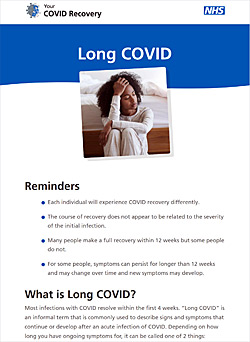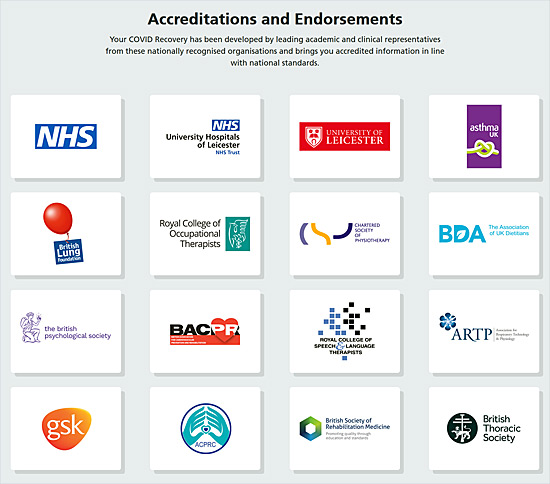The NHS has produced a new website providing support and resources about recovering from Covid and how to deal with 'Long-Covid', it's symptoms and to seek help.
Whilst many are skeptical of any information or advice regarding Covid that emanates from the Government and its departments, including that of the Department of Health and Social Care, the 'Covid Recovery' website is resourced by a whole number of independent organisations and authoritive sources of information and research; as can be seen at the foot of this page.
Providing help to identify just what 'Long-Covid' actually is, it gives this definition and list of symptoms for the long-term effects of this often debilitating aspect of the Covid-19 pandemic:
What is Long COVID?
Most infections with COVID resolve within the first 4 weeks. “Long COVID” is an informal term that is commonly used to describe signs and symptoms that continue or develop after an acute infection of COVID. Depending on how long you have ongoing symptoms for, it can be called one of 2 things:
- Ongoing symptomatic COVID
This is where your symptoms continue for more than 4 weeks. If your symptoms last for longer than 12 weeks, it will then be called;
- Post-COVID Syndrome
This is where your ongoing symptoms continue for longer than 12 weeks and cannot be explained by any other condition.
Symptoms of Long Covid can be many and varied and can change over time. The most commonly reported symptoms include (but are not limited to) the following:
Respiratory & Cardiovascular symptoms
- Breathlessness
- Cough
- Chest tightness
- Chest pain
- Palpitations
Generalised symptoms
 Neurological symptoms
Neurological symptoms
- Cognitive impairment (‘brain fog’, loss of concentration or memory issues)
- Headache
- Sleep disturbance
- Pins and needles or numbness
- Dizziness
- Delirium (in older people)
Gastrointestinal symptoms (digestive system)
- Abdominal pain
- Nausea
- Diarrhoea
- Anorexia and reduced appetite (in older people)
- Weight loss
Musculoskeletal symptoms
Psychological/psychiatric symptoms
- Symptoms of depression
- Symptoms of anxiety
Ear, nose and throat symptoms
- Tinnitus
- Earache
- Sore throat
- Loss of taste and/or smell
Dermatological symptoms
NICE Guidance Dec 2020
Click the pic above right to download this and further information as a PDF document.
The website also provides further information, with the page entitled 'When Do I Need To Seek Help?' being one of the most important of the site.
Most of the sections of the website can also be downloaded in PDF format in order to print and share the information provided.
Clikc the pic below to go to the NHS 'Your Covid Recovery' website:

Source: NHS